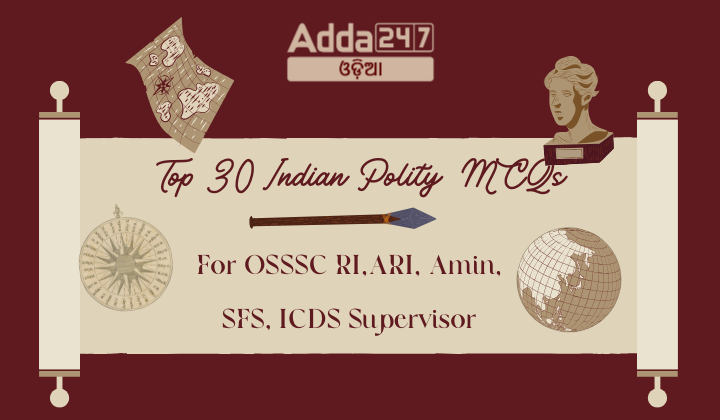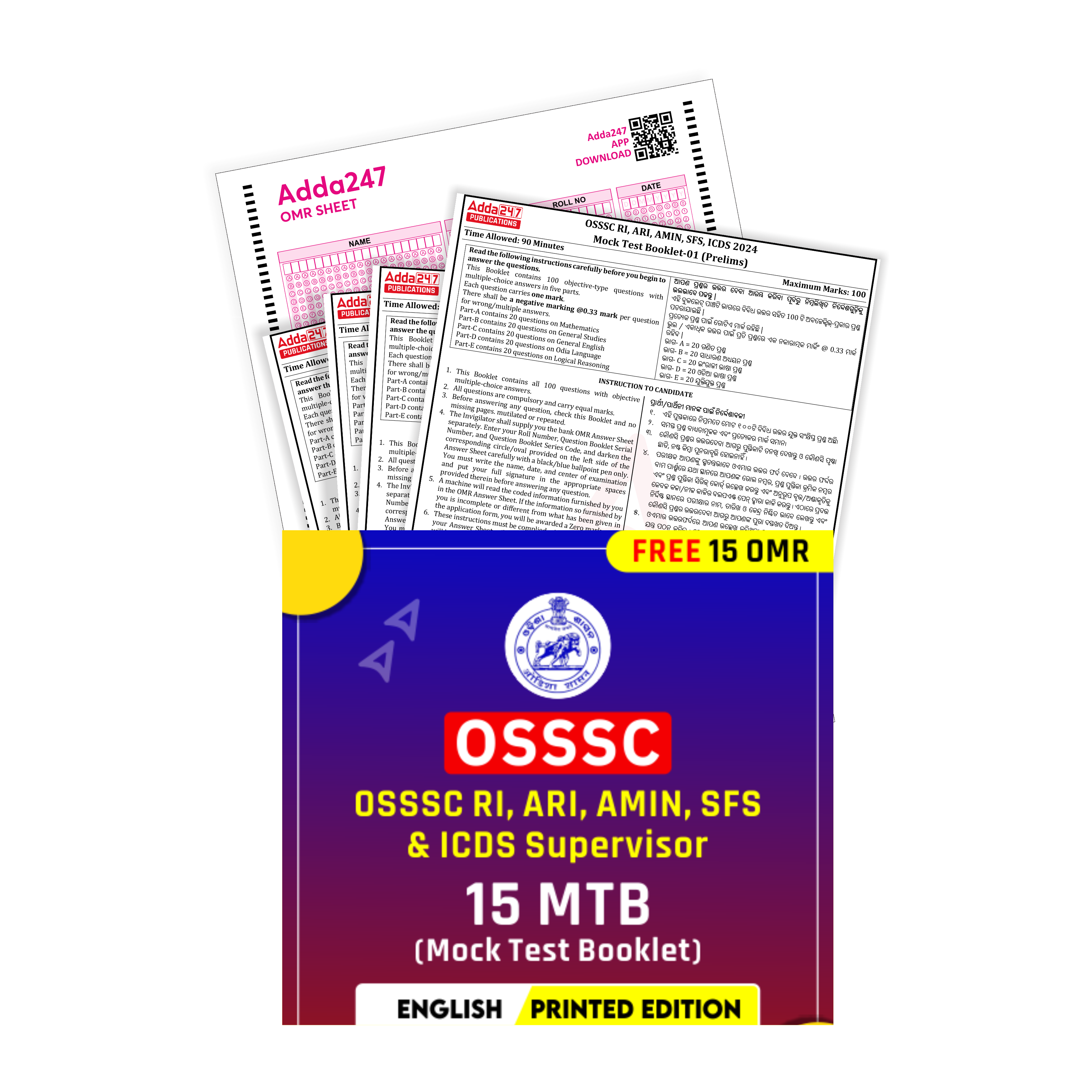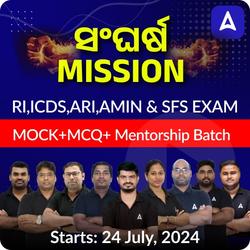Indian Polity is a crucial section for competitive exams like OSSSC RI, ARI, Amin, SFS, and ICDS, where a solid understanding of the Indian Constitution, political institutions, and fundamental principles of governance is tested. Top MCQs often cover essential topics such as the features and significance of the Preamble, the fundamental rights and duties of citizens, and the Directive Principles of State Policy. Questions might delve into the structure and functioning of the Parliament, including the roles of the Lok Sabha and Rajya Sabha, the process of law-making, and the nuances of parliamentary procedures.
Top 30 Indian Polity MCQs for OSSSC RI,ARI, Amin, SFS, ICDS Supervisor
- Which one of the following is true about High courts?
(a) It has original and appellate jurisdiction
(b) It enjoys the power of judicial review
(c) It acts as the court of law
(d) All the above
Ans. (d) - At present, how many high courts are there in India?
(a) 25
(b) 21
(c) 28
(d) 29
Ans. (b) - Which one of the following articles deals with the appointment of judges?
(a) Article 214
(b) Article 217
(c) Article 226
(d) Article 216
Ans. (b) - High courts issue writs under article-………
(a) 220
(b) 221
(c) 213
(d) 226
Ans. (d) - The chief justice and other judges of the high courts are appointed by which one of the following?
(a) Prime Minister
(b) Chief Minister
(c) Governor
(d) President
Ans. (d) - Which is the oldest known system designed for the redressal of citizen’s grievances?
(a) Ombudsman System
(b) Lokpal
(c) Lokayukta
(d) None of the above
Ans. (a) - Which was the first Indian state to establish the institution of Lokayukta?
(a) Bihar
(b) Uttar Pradesh
(c) Andhra Pradesh
(d) Maharashtra
Ans. (d) - When did The Lokpal and Lokayuktas Act, 2013, come into force?
(a) January 2013
(b) May 2013
(c) December 2013
(d) January 2014
Ans. (a) - Who appoints the Lokayukta and Upalokayukta?
(a) Governor of the state
(b) Chief Minister
(c) Speaker of Lok Sabha
(d) Judge of High Court
Ans. (a) - Which state’s Lokayukta’s office is considered to be the strongest in terms of power and scope?
(a) Bihar
(b) Karnataka
(c) Andhra Pradesh
(d) Maharashtra
Ans. (b) - Which fundamental rights cannot be suspended even during an emergency?
(a) Right to Speech
(b) Right to Religion
(c) Right to Equality
(d) Right to Life and Personal Liberty
Ans: (d) - The Fundamental Duties are mentioned in:
(a) Part-IV A
(b) Part-IV
(c) Part-III
(d) In schedule IV-A
Ans: (a) - Which of the following Article of the Indian Constitution contains Fundamental Duties?
(a) 45 A
(b) 51 A
(c) 42
(d) 30B
Ans: (b) - Which of the following are Fundamental Duties?
(a) Safeguarding public property
(b) Protecting the sovereignty, integrity and unity of India
(c) Developing scientific temper and humanism
(d) All the above
Ans: (d) - Which of the following committee suggested incorporating Fundamental Duties in the Indian Constitution?
(a) Malhotra Committee
(b) Raghavan Committee
(c) Swaran Singh Committee
(d) Narasimhan Committee
Ans: (c) - Which of the following Articles of the Indian Constitution contain the Right to Religious Freedom?
(a) Articles 25-28
(b) Articles 29-30
(c) Articles 32-35
(d) Articles 23-24
Ans: (a) - Which of the following Article of the Indian Constitution guarantees ‘Equality Before the Law and Equal Protection of Law within the Territory of India’?
(a) 15
(b) 14
(c) 17
(d) 18
Ans: (b) - Which Article of the Indian Constitution abolishes Untouchability?
(a) Article 18
(b) Article 15
(c) Article 14
(d) Article 17
Ans: (d) - Which of the following is correct with respect to “Right Against Exploitation”?
(a) Prohibition of traffic in human beings and forced labour
(b) Freedom as to payment of taxes for the promotion of any particular religion
(c) Protection of interests of minorities
(d) Equality before the law
Ans: (a) - In which part of the Indian Constitution, the Fundamental Rights are provided?
(a) Part II
(b) Part III
(c) Part V
(d) Part IV
Ans: (b) - Which of the following is not a feature of Election system in India?
A. Universal Adult Franchise
B. Secret Voting
C. Reservation of seats in the legislature for the members of Scheduled Castes and Scheduled Tribes
D. Communal Electorate
Ans: D - Elections in India for Parliament and State Legislatures are conducted by…..
A. President
B. State Election Commission
C. Governor
D. Election Commission of India
Ans: D - Members of Election Commission are appointed by……..
A. President of India
B. Prime Minister of India
C. Elected by the people
D. Chief Justice of India
Ans: A - Which article of the Indian constitution says that will be an election commission in India?
A. Article 124
B. Article 342
C. Article 324
D. Article 115
Ans: C - The number of seats reserved for scheduled caste in the Lok sabha is:
A. 59
B. 79
C. 89
D. 99
Ans: B - Which Articles in the Constitution give provisions for the electoral system in our country?
A. Articles 124-128
B. Articles 324-329
C. Articles 256-259
D. Articles 274-279
Ans: B - The elections for Lok Sabha are held every:
A. 3 years
B. 4 years
C. 5 years
D. 6 years
Ans: C - Which among the following statements is/are false?
1. For qualifying to the Lok Sabha, a person must be at least 25 years of age
2. A person can be a member of both Lok Sabha and Rajya Sabha at the same time
3. A person belonging to Scheduled Caste and Scheduled Tribe can contest elections from a general seal also, and not just with the reserved seat
4. If a member of either of the Houses votes against the directions given by his party, he can be deemed to be disqualified
Code:
A. Only 1
B. Only 2 and 4
C. Only 3
D. Only 2
Ans: D - What is the maximum allowed duration between the last session of the dissolved Lok Sabha and the recalling of the Lok Sabha?
A. 2 months
B. 4 months
C. 5 months
D. 6 months
Ans: D - Which is the smallest Lok Sabha Constituency in General Elections by area?
A. Delhi Sadar
B. Mumbai South
C. Kolkata North West
D. Chandni Chowk, Delhi
Ans: D










